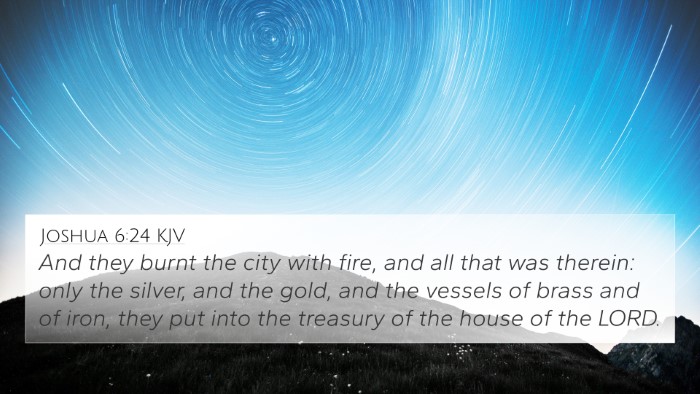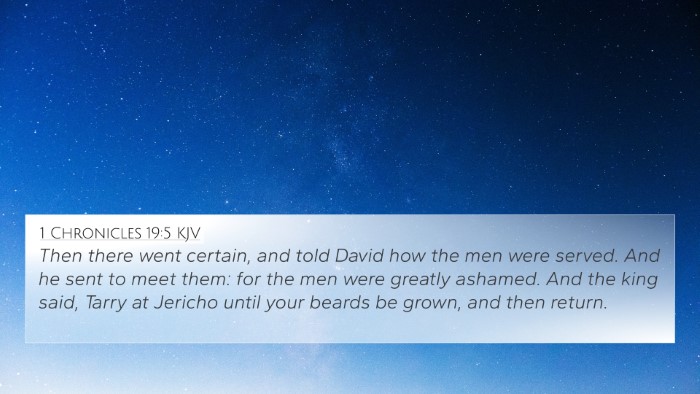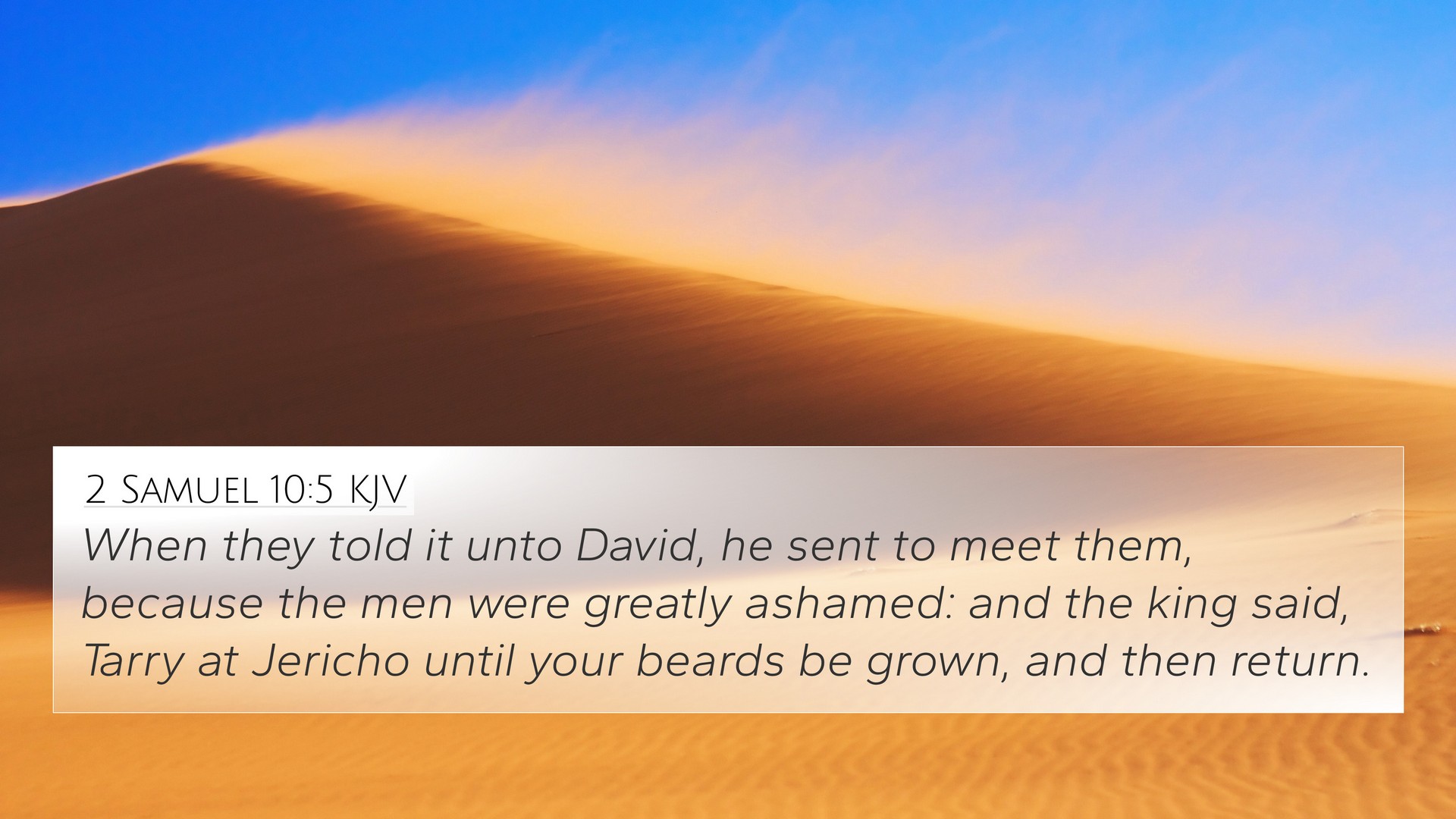Old Testament
Genesis Exodus Leviticus Numbers Deuteronomy Joshua Judges Ruth 1 Samuel 2 Samuel 1 Kings 2 Kings 1 Chronicles 2 Chronicles Ezra Nehemiah Esther Job Psalms Proverbs Ecclesiastes Song of Solomon Isaiah Jeremiah Lamentations Ezekiel Daniel Hosea Joel Amos Obadiah Jonah Micah Nahum Habakkuk Zephaniah Haggai Zechariah Malachi2 Samuel 10:5 Similar Verses
2 Samuel 10:5 Cross References
When they told it unto David, he sent to meet them, because the men were greatly ashamed: and the king said, Tarry at Jericho until your beards be grown, and then return.
Uncover the Rich Themes and Topics of This Bible Verse
Listed below are the Bible themes associated with 2 Samuel 10:5. We invite you to explore each theme to gain deeper insights into the Scriptures.
2 Samuel 10:5 Cross Reference Verses
This section features a detailed cross-reference designed to enrich your understanding of the Scriptures. Below, you will find carefully selected verses that echo the themes and teachings related to 2 Samuel 10:5 KJV. Click on any image to explore detailed analyses of related Bible verses and uncover deeper theological insights.

Joshua 6:24 (KJV) »
And they burnt the city with fire, and all that was therein: only the silver, and the gold, and the vessels of brass and of iron, they put into the treasury of the house of the LORD.

1 Kings 16:34 (KJV) »
In his days did Hiel the Bethelite build Jericho: he laid the foundation thereof in Abiram his firstborn, and set up the gates thereof in his youngest son Segub, according to the word of the LORD, which he spake by Joshua the son of Nun.

1 Chronicles 19:5 (KJV) »
Then there went certain, and told David how the men were served. And he sent to meet them: for the men were greatly ashamed. And the king said, Tarry at Jericho until your beards be grown, and then return.
2 Samuel 10:5 Verse Analysis and Similar Verses
Understanding 2 Samuel 10:5
Verse: 2 Samuel 10:5: "When David was told of it, he sent to meet them: for the men were greatly ashamed. And the king said, Tarry at Jericho until your beards be grown, and then return."
Summary of the Verse’s Meaning
This verse depicts an incident involving David’s response to the shame experienced by the Ammonite envoys. After the King of Ammon had insulted them by shaving half their beards, David acted with compassion and dignity. He instructed them to stay in Jericho until their beards grew back, demonstrating both an understanding of cultural honor and a desire to restore their dignity.
Insights from Public Domain Commentaries
- Matthew Henry's Commentary:
Henry emphasizes the importance of personal dignity and cultural norms. He explains that a beard was a significant mark of a man’s standing in society, and David’s command to allow the envoys time to regrow their beards reflects his sensitivity to their humiliation. Henry notes that this was a diplomatic act as well as a moral one, showing that true leadership involves compassion for those who serve us.
- Albert Barnes' Notes:
Barnes focuses on the broader implications of this act, highlighting how David's response was strategic. He notes that allowing the men to regain their honor was not merely an act of kindness but also served to reinforce David's reputation and establish goodwill with the Ammonites. This illustrates the principle of maintaining honor in diplomatic relations.
- Adam Clarke's Commentary:
Clarke draws attention to the cultural significance of the beard in ancient Israel and surrounding nations. He details how the act of shaving half of a man's beard would be seen as both a disgrace and a provocation. Clarke suggests that David’s reaction reveals his wisdom in handling situations that could escalate into conflict.
Key Themes and Biblical Connections
This verse interconnects with various themes in the Bible, such as honor, compassion, and the importance of reconciliation. Here are some relevant cross-references that elucidate these themes:
- 1 Samuel 10:1: The anointing of Saul as king parallels David’s leadership qualities.
- 1 Chronicles 19:2: Details David’s motives for sending envoys, illustrating diplomatic gestures.
- Proverbs 15:1: "A soft answer turns away wrath," reflecting David’s desire for peace.
- Matthew 5:9: "Blessed are the peacemakers," encapsulating David’s actions as a peacemaker.
- Philippians 2:3: Encourages humility, echoing David's respect for his men’s honor.
- Romans 12:18: Advises living peaceably, similar to David’s diplomatic tactics.
- Luke 6:31: Golden Rule of treating others as you wish to be treated, reflected in David's actions.
Inter-Biblical Dialogue
The incident in 2 Samuel 10:5 not only reveals David's character but also prompts readers to explore the broader dialogue between Old and New Testament teachings. Themes of honor and reconciliation permeate throughout scripture, connecting narratives and ethical teachings across the Bible.
Applying the Lessons of 2 Samuel 10:5
When studying this passage, use these bible cross-reference tools and principles to enhance understanding:
- Consider how to find cross-references in the Bible using a concordance or a digital study tool.
- Engage in a comparative study of Pauline epistles to explore similar themes of dignity and honor.
- Investigate bible cross-reference methods to strengthen your understanding of related scriptures.
- Reflection on links between the Prophets and Apostolic teachings can deepen comprehension of honor in cultural contexts.
Conclusion
2 Samuel 10:5 serves as a profound reminder of the nuances of leadership, the importance of cultural respect, and the ways in which interpersonal relationships can be navigated with grace. By cross-referencing this verse with others, believers can uncover rich layers of meaning that enhance their understanding of scripture.


